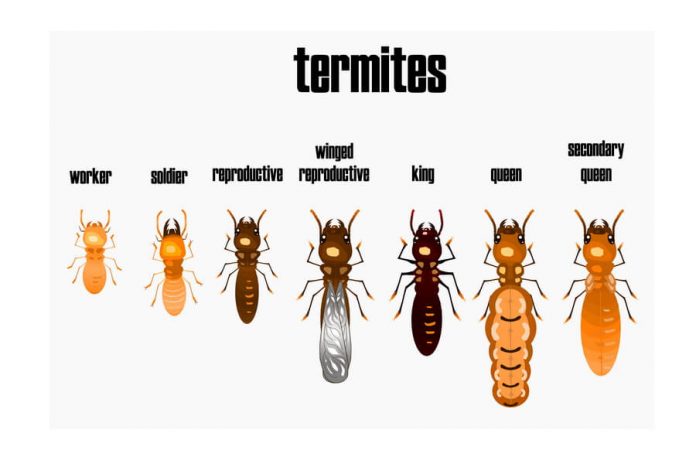How to get rid of termites. There’s probably nothing worse than finding out that there are termites in your house. Not only are these insects incredibly uncomfortable, but they can also quickly spread around the house, forming colonies and hiding in the corners of furniture and walls. They also destroy objects made of wood and even concrete and that in a few seconds.
Taking action against termites is often difficult because you often don’t notice them until they have done a lot of damage. In such cases, it only helps to call experienced experts to take care of the problem.
However, if you look carefully, you can find out if there are termites in your house early on and tackle the problem early on.
Finding out if there are termites in your home
The first sign of termites is piles of dust near your furniture. If you see something like this, then you should press down on the wood to see if it’s hollow inside.
If the problem is in the walls, look for cracks. Termites build tunnels and thus spread around the house. It is always helpful to see if there is wood, firewood, or rubble near your house as this is often the cause of a termite plague.
Get rid of termites

Now that you’ve learned how to find out if there are termites in your home, it’s time to learn a few simple tricks on how to get rid of the insects and keep your home from a termite infestation.
As you already know, once the termite plague has spread, you may need professional help. Fortunately, at the early stages, however, there are some cheap, simple products that can help you solve problems.
1. Vinegar: How to get rid of termites
Not only does vinegar kill termites, it also prevents more termites from nesting in your home. Vinegar can be mixed with water in a 1: 1 ratio for the most effective use.
You can pour the vinegar water into a spray bottle and use it to spray the mixture onto furniture and walls.
2. Clove oil: How to get rid of termites
You can find clove oil at most health food stores, pharmacies, or stores that specialize in perfumes and cleaning products.
Clove oil can be used to kill termites on floors by wet wiping floors with clove oil. In the end, you have dead termites and a great smelling house.
3. Orange oil
When looking to get rid of termites, many people do not want to use products that are toxic to humans or pets. For this reason, orange oil is the best choice because it kills termites easily while not harming other residents.
You can put the orange oil on a damp cloth and use it to wipe surfaces that have been infected by termites. You can also use it to wipe pieces of furniture so that they don’t get infected too. Keep in mind, however, that orange oil will only work with small populations of termites.
4. Kerosene or lubricant
Kerosene and lubricants are also used to fight termites. However, there is one drawback to this: they can be toxic to pets and humans. For this reason, you should be careful when using these substances.
Take a damp rag and use it to wipe off furniture that has to infect by termites. If you are using lubricants, consider using a spray bottle.
5. Borax
If you use borax on a termite infestation, the termites will eat it up. As a result, they can no longer take up wood or concrete and then die quickly.
When using borax, you should wear safety glasses and safety gloves. Mix 0.45 kg of borax powder with just under 4 liters of water and use it to spray the termite-infested areas. Remember, you shouldn’t let children or animals near borax.
6. Insecticides
As you can imagine, insecticides can also help put an end to termites. Insecticides protect your furniture from re-infestation. In any case, pay attention to the instructions for use when using the product for the first time.
Have you ever had a similar problem? How did you get rid of the termites? Tell us about your tips in the comments.
This article is for informational purposes only. Do not self-diagnose or self-medicate, and be sure to consult a certified health care practitioner before using the information in this article. The editors do not guarantee any results and are not responsible for any damage that may result from the use of the information provided in this article.
Also Read: What is a duvet
